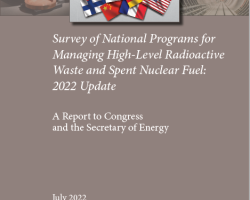Category of Content
Siting Experience Documents Only
Publication Date
Subject Matter
Neutron Absorber Material Corrosion Testing Final Report
Neutron Absorber Material Corrosion Testing Final Report
Neutron Absorber Material Corrosion Testing Preliminary Report
Neutron Absorber Material Corrosion Testing Preliminary Report
Basis for Identification of Disposal Options for Research and Development for Spent Nuclear Fuel and High-Level Waste
Basis for Identification of Disposal Options for Research and Development for Spent Nuclear Fuel and High-Level Waste
Data to Support Development of Geologic Framework Models for the Deep Borehole Field Test
Data to Support Development of Geologic Framework Models for the Deep Borehole Field Test
Geologic Framework Models for the Alluvial Basin Reference Case
Geologic Framework Models for the Alluvial Basin Reference Case
Considerations of the Differences between Bedded and Domal Salt Pertaining to Disposal of Heat- Generating Nuclear Waste?
Considerations of the Differences between Bedded and Domal Salt Pertaining to Disposal of Heat- Generating Nuclear Waste?
Neutron Absorber Material Corrosion Testing Final Report FY2021
Neutron Absorber Material Corrosion Testing Final Report FY2021
Status of Shale Geology: Information on Extent, Thickness and Depth of Shale Deposits
Status of Shale Geology: Information on Extent, Thickness and Depth of Shale Deposits
Support Clad and Neutron Poison Testing
Support Clad and Neutron Poison Testing
Deep Borehole Disposal Research: Geological Data Evaluation, Alternative Waste Forms, and Borehole Seals
Deep Borehole Disposal Research: Geological Data Evaluation, Alternative Waste Forms, and Borehole Seals
The Effect of Boron on the Thermal Sensitization of Grade A Type
The Effect of Boron on the Thermal Sensitization of Grade A Type
Evaluation of Neutron Absorbers in the DOE Standardized SNF Canister
Evaluation of Neutron Absorbers in the DOE Standardized SNF Canister
Materials for Consideration in Standardized Canister Design Activities??
Materials for Consideration in Standardized Canister Design Activities??
M3SF-19OR0204050160- Criticality Process, Modeling and Status for UNF-STDARDS
M3SF-19OR0204050160- Criticality Process, Modeling and Status for UNF-STDARDS
United Nations Declaration on the Rights of Indigenous Peoples
United Nations Declaration on the Rights of Indigenous Peoples
The General Assembly, Taking note of the recommendation of the Human Rights Council contained in its resolution 1/2 of 29 June 20061 , by which the Council adopted the text of the United Nations Declaration on the Rights of Indigenous Peoples, Recalling its resolution 61/178 of 20 December 2006, by which it decided to defer consideration of and action on the Declaration to allow time for further consultations thereon, and also decided to conclude its consideration before the end of the sixty-first session of the General Assembly, 1 See Official Records of the General Assembly, Sixty-first S
Transportation Planning: Indigenous Dialogue
Transportation Planning: Indigenous Dialogue
In 2019, the NWMO commissioned Maawandoon Inc to lead Indigenous Dialogue session to support NWMO’s transportation planning for the long-term care of Canada’s used nuclear fuel. This research built upon and complemented public attitude research carried out in 2017 and 2018. The research methodology consisted of 7 Indigenous dialogue sessions and attendance at 3 Indigenous Annual General Assemblies (AGA)/meetings with dialogue components.
Topical Analysis of Nuclear Experts' Perceptions of Publics, Nuclear Energy, and Sustainable Futures
Topical Analysis of Nuclear Experts' Perceptions of Publics, Nuclear Energy, and Sustainable Futures
Nuclear energy experts consider commercial power from fission to be a strong contender to help mitigate the increasing effects of climate change, in part due to its low-to-no carbon emissions. Nevertheless, nuclear energy's history, including meltdowns such as Three Mile Island, Chernobyl, and Fukushima, and dumping in sacred Indigenous land such as Yucca Mountain, raises important concerns in public deliberation over nuclear power.
Survey of National Programs for Managing High-Level Radioactive Waste and Spent Nuclear Fuel: 2022 Update
Survey of National Programs for Managing High-Level Radioactive Waste and Spent Nuclear Fuel: 2022 Update
In October 2009, the U.S. Nuclear Waste Technical Review Board (Board or NWTRB) published Survey of National Programs for Managing High-Level Radioactive Waste and Spent Nuclear Fuel. For each of the 13 national programs studied, the report catalogued 15 institutional arrangements that had been set in place and 15 technical approaches that had been taken to design repository systems for the long-term management of high-activity radioactive waste.

